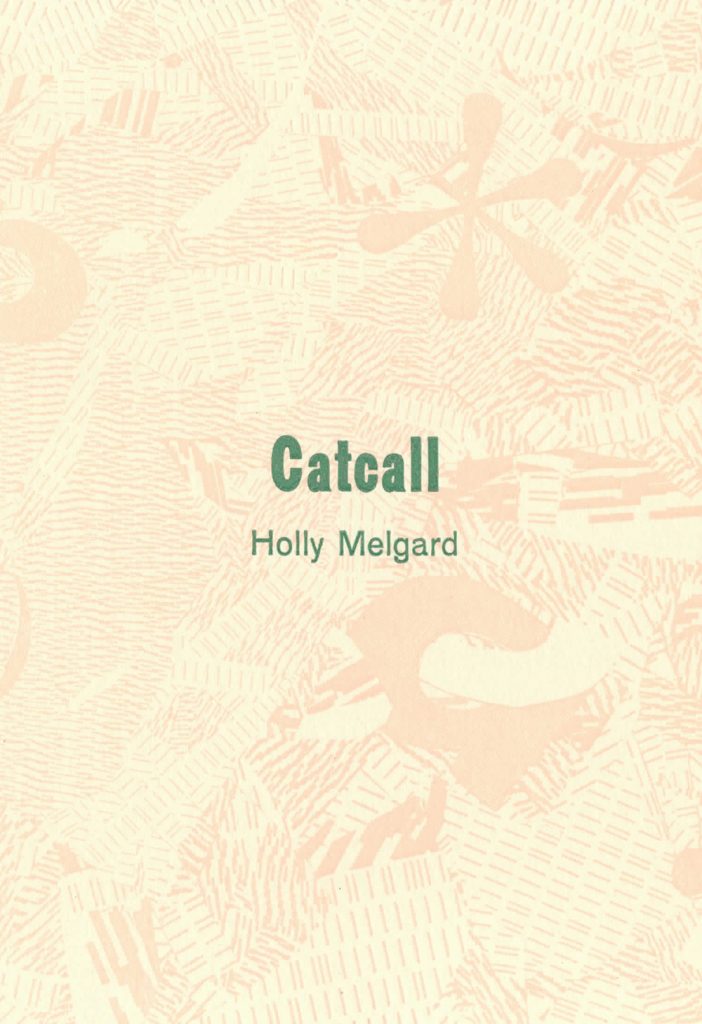
Catcall
Holly Melgard
November 2017
What the fuck. Why is he like that? I mean, look at that butt. I totally want to cup his butt right now. That’s what I want to do. Yeah I want to do that to him now.
—What’s up, babybutt? Let me get your bod. Let me get your butt. Let me cup your butt. I need to cup your butt right now. What do you think about that? Come on. Let’s just cup butts for a minute. It’ll only take a minute. Oh come on. Let me cup you. It’s just butt cupping.
Look at how smooth his butt looks. It’s so smooth. You know the hairs on it are all soft. And silky. He’s probably got one of those rug butts that’s too soft to give you rug burn, that’s how silky it is.
—Oh come on, don’t be like that. I just want to touch your soft butt. rn
Smothers with a weaponised sympathy ...
Trisha Low
Catcall is a poem in which a voice catcalls a guy passing by in a public place. Written for performance, the voice alternates between speaking directly to this guy and speaking indirectly about him within earshot.
About the Author
Holly Melgard is the author of Fetal Position (Roof), named by Jackie Ess as one of Artforum’s “Best of 2021.” In addition to publishing the chapbooks Catcall (UDP) and Divisions of Labor (Make Now), she has also self-published ten books of poetry on Troll Thread press, including Black Friday and The Poems for Baby trilogy, as well as the co-authored books (along with Joey Yearous-Algozin) White Trash and Liquidation. She is a co-editor and designer of Troll Thread press (co-founded with Yearous-Algozin, Chris Sylvester, and Divya Victor), which is a print-on-demand / free pdf download platform. Having performed her work at such sites as the New York Museum of Modern Art and the Los Angeles Museum of Contemporary Art, her work has also appeared in BOMB Magazine, Best American Experimental Poetry anthology, and was translated in the German journal Merkur. She wrote her doctorate in the SUNY Buffalo Poetics Program on Poetics of Ubiquitization: Textual Conditions of and for the Ubiquitous Computing Age. A recent guest faculty in the Banff Winter Writers Retreat, she currently teaches writing at New York University and City University of New York, freelance book designs, and lives in Brooklyn, NY.
Praise
Catcalling -- the most avid activity of your typical heterosexual male. But him, with his stock of singular and eccentric aphorisms, is no match for Holly Melgard's literalisations. In this age of purely symbolic and frankly banal 'pussy grabs back', Catcall's claustrophobic babble instead narrativises the absurdity of feminine caregiving labour: "Hey pretty big little cute guy. Do you need to cuddle? Do you?" Here, Melgard stages the real comedy, illustrating how any man's sense of power exhausts itself in his very fantasy of what 'woman' might do for him -- by actually embodying it. And so, she smothers with a weaponised sympathy, burrowing neurotic pathways into your emasculation. Hey baby, there's no escape. C'mon baby, you know how much I care.
Trisha Low
In Catcall, the pleasures of domestic language run wild, topsy turvy. Holly Melgard’s project brings me back to Fanny Howe’s writing on Pinnochio and the revolutionary play of mothers and children. At home, away from patriarchs and judges, Howe says, the imagination roams free. Except there are no mothers or children here, no puppets, and Melgard knows that you never really get away.
Stephanie Young
Catcall is great. Really. It’s a weird mix of tonal precision and conceptual ambiguity. Melgard’s rendering of speech is pitch-perfect, but she doesn’t reveal her procedure or intentions, leaving the book unframed. This makes the text—in which a relentless speaker insistently demands the affection of an unnamed interlocutor—more unsettling. It has something to do with the voice: as an intruder, as a weapon, as a form of intimacy. And it has something to do with careful listening and transcription. And it has something to do with repetition, harassment, and obsession. It’s creepy. And great.
Steven Zultanski
In the News
Publication Details
Chapbook
Saddle-stitched. 24 pp, 5 x 7 in
Publication Date: November 01 2017
Distribution: Direct Only